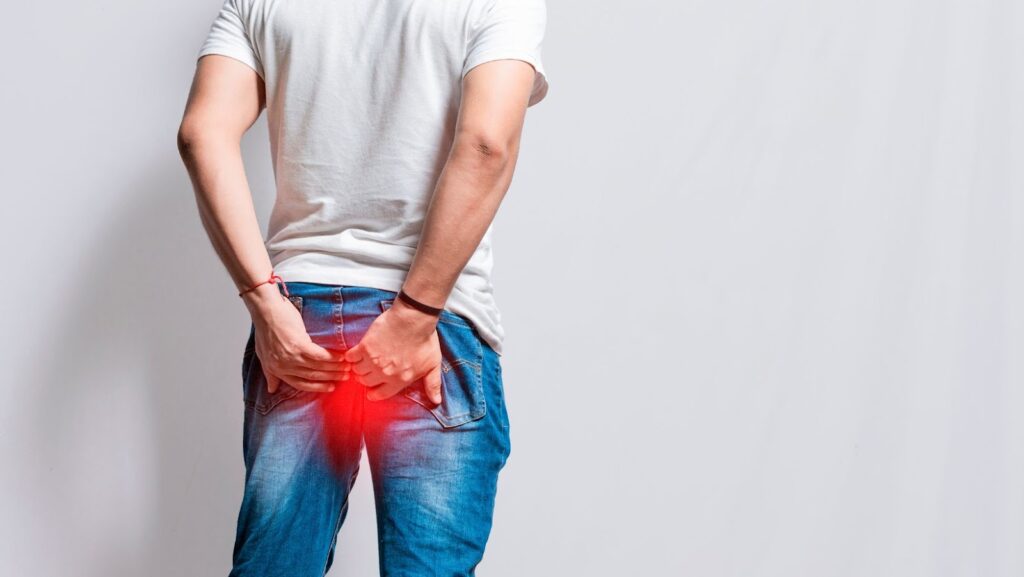
You may be feeling a bit uncomfortable, taken aback, and even scared if you’ve just been diagnosed with hemorrhoids.
This article will provide useful tips and tricks on how to treat and prevent a hemorrhoid flare-up, so you can take control of your health and get back on track.
Practice Good Hygiene
When you’re dealing with hemorrhoids, it’s important to practice good hygiene in order to reduce the risk of infection and help relieve discomfort. Keeping the area clean is essential, as it will help reduce itching caused by sweat and bacteria. To do this, use lukewarm water and a gentle cleanser, or simply opt for baby wipes. You should also make sure that you dry the area with a soft (preferably cotton) towel after cleansing, as leaving the skin damp may lead to additional irritation.
It’s important to change underwear daily during treatment for hemorrhoids to ensure the area is kept clean and dry at all times. Avoid using fabrics such as nylon or spandex in order to minimize sweat accumulation which could further irritate the skin and aggravate symptoms. Additionally, sitz baths may be helpful in relieving discomfort associated with hemorrhoids; however, if your signs and symptoms worsen or do not respond quickly enough then you should consult your doctor right away!
Practicing good hygiene alongside other treatments prescribed by your healthcare provider will go a long way towards managing both acute and chronic cases of hemorrhoids.
Use Over-the-counter Creams and Ointments
When dealing with the uncomfortable symptoms of hemorrhoids, it can be tempting to try home remedies and alternate treatments to find relief. However, when it comes to relieving these irritating flare-ups, using over-the-counter creams and ointments is one of the most reliable approaches. Hemorrhoid creams are designed to reduce inflammation and irritation in the anal area, providing quick relief from itching, burning, pain and discomfort. Check out how to apply hemorrhoid cream.
When applying hemorrhoid cream, there are a few things to keep in mind: First, make sure that you cleanse the area thoroughly before application; this will help prevent further irritation from bacteria or dirt that can be left behind on the skin. Next, carefully read all instructions included with your product so you know exactly how much cream to apply; too little cream may not provide adequate relief and too much could irritate skin even further. Finally, try to avoid rubbing or scratching the affected area as this could worsen symptoms.
Using over-the-counter hemorrhoid creams should not be viewed as a long-term solution; medications are designed for temporary relief until other treatment options can be discussed with a doctor or healthcare professional. However, following proper steps and using these medications as directed can certainly provide welcomed temporary respite and comfort while you seek other options for treatment.
Take Over-the-counter Pain Relievers
If you get hemorrhoids, there are several methods of relieving the pain and discomfort they can cause. The main goal is to reduce the pressure on the area so that the veins can heal. The first step is to take over-the-counter medicines such as ibuprofen (Advil) or naproxen (Aleve) which can help reduce the pain and swelling associated with hemorrhoids. You can also take stool softeners, such as docusate sodium (Colace or Surfak), if needed to make it easier to pass stools.
In addition, there are other things you can do for painful hemorrhoids including: avoiding straining when making a bowel movement; increasing your intake of fluids and fiber; taking a sitz bath in warm water; using cold packs or an ice pack on the hemorrhoid; and using creams and ointments obtained from pharmacies containing ingredients that might help, such as phenylephrine, lidocaine, hydrocortisone, pramoxine and tribenoside. However, speak to your doctor before trying any medication for internal use.
For significant bleeding, especially if it occurs in large pools of fresh blood on toilet tissue or after straining to pass stools, you should talk with your health care provider right away as this could be an indication of another medical issue that needs attention.
If left untreated or neglected, hemorrhoids can worsen over time resulting in difficulty walking or sitting due to pain or discomfort so if you think you have them see a doctor right away for an accurate diagnosis and treatment plan.
Try a Sitz Bath
Hemorrhoids can be very uncomfortable, itchy and painful and can be a recurring problem for some. A sitz bath is one of the first steps to take in order to help relieve symptoms and lessen discomfort. It can also help to prevent additional irritation and reduce the risk of infection. A sitz bath is a shallow bath, usually with warm water mixed with salt or baking soda, that can be used to reduce inflammation in the affected area.
The goal of this method is to provide a small amount of warmth without soaking into too deeply. When taking a sitz bath, it’s important that the water covers just up to your hips so as not to submerge any other parts of your body in too much heat or cause further irritation. You will want to use warm (not hot) water temperature when performing this type of soak as too much heat can aggravate the area even further and make matters worse.
In addition to sitting in a sitz bath, you should also take other measures that may help reduce symptoms such as drinking plenty of fluids, eating more fiber-rich foods like fruits and vegetables, taking an over-the-counter stool softener if needed, avoiding straining during bowel movements, not sitting for long periods of time on hard surfaces such as toilets that are not well padded and resistance training exercises like squats or pelvic tilts which strengthen muscle tone on the rectal wall which supports hemorrhoids from inside out. Additionally try rinsing your anal area in tepid tap water intermittently throughout the day using clean fingers for two minutes each time for maximum relief from pain and itching discomfort associated with hemorrhoids.
Eat a High-Fiber Diet
Hemorrhoids are a common, but uncomfortable condition that can happen to anyone and can range from mild to severe. Fortunately, there are some simple lifestyle changes that you can make that may help reduce the discomfort associated with having hemorrhoids. One of the most important of these changes is to eat a diet that is high in fiber.
Fiber helps to make stools softer and easier to pass, which may reduce pain associated with hemorrhoidal flare-ups. Eating foods that are high in fiber such as legumes, fruits, vegetables and whole grains can help your body create soft stools that are easier to pass. In addition, drinking enough water throughout the day will also further support this goal by helping keep your bowels hydrated.
Furthermore, supplementing your diet with buffered aspirin or ibuprofen may help reduce inflammation associated with hemorrhoidal flare-ups. Taking these medications according to the instructions provided on their packaging will provide relief from pain and itching sensations caused by this condition. It is important to keep in mind however, not everyone who experiences nausea or vomiting should use NSAIDS; it may be better for you to use other forms of treatment instead.
Finally, taking hot baths or using a warm compress (heated damp towel) around the affected area for several minutes at a time can provide temporary relief from Hemorrhoid symptoms such as discomfort and pain. These methods should alleviate symptoms within 15-20 minutes of application as opposed to just 1-2 hours when using medication alone.
Get Regular Exercise
If you suffer from hemorrhoids, exercising regularly can make a big difference in relieving your symptoms. Exercise helps improve circulation in the body and strengthens your muscles, which can help reduce pain and swelling associated with hemorrhoids. The best exercises for hemorrhoid relief are low-impact activities such as walking, cycling and swimming. Aim for 30 minutes of exercise each day to help keep your muscles strong and healthy.
It is important to stay well hydrated when exercising to replace any fluids lost through sweat and ensure that all of your organs are functioning properly. Drink at least 8 glasses of water every day – this will help to keep the digestive system working efficiently, which is important in preventing flare ups caused by constipation. You should also try to consume a diet high in fiber to support regular digestion and bowel movements. Eating plenty of fruits, vegetables and whole grains will ensure you are getting adequate fiber in order to avoid further flare ups associated with constipation or straining during bowel movements.
Lastly, pay attention to your form when performing any type of physical activity that could cause additional pressure on any area affected by hemorrhoids – such as heavy lifting or excessive squatting – as this could lead to further inflammation or irritation in already sensitive areas. Regular exercise can be an effective way to help manage pain related to existing hemorrhoids, but it is important that you take appropriate measures before engaging in physical activity each day so as not cause further discomfort or exacerbation of your existing condition.
Avoid Straining During Bowel Movements
If you’re suffering from hemorrhoids, you’re probably looking for relief. One of the best things to do is to take the right steps to avoid straining during bowel movements. While eliminating the pain can be concerning, it’s possible to reduce symptoms through lifestyle changes and better health habits. Straining during bowel movements can make hemorrhoids worse by increasing pressure in the rectum that causes more swelling, which can cause even more discomfort if not addressed properly.
Here are some tips for preventing straining during bowel movements:
- Drink plenty of water throughout the day and make changes to your diet like adding fiber-rich foods such as fruits, vegetables, and whole grains. This can help with softer stools that don’t require excessive force when pushing them out.
- Nowadays there are several products that help in relieving pain entering the market like specific cushions designed for those with hemorrhoids or analgesic gels used as a slight anesthetic so it lessens some of the discomfort at lower levels while promoting healing as well.
- Exercise regularly as physical activity helps in keeping your bowels regular and well taken care of! That doesn’t only prevent constipation or bloating but also decreases pressure in your rectal area which helps with reducing swelling aggressing health condition causing pain
- Seek professional medical advice should discomfort remains persistent! With proper evaluation they may prescribe medication or other treatment options that are best suited for your condition like infrared coagulation (IRC) or injection sclerotherapy – those are a few examples of treatments used by medical professionals when treating this matter
By following these guidelines it’ll be easier to prevent extra strain exerted on your rectal area ultimately helping you reduce some unwanted inflammation and consequently alleviating associated pain altogether!
When Do We Need to Visit a Doctor?
Hemorrhoids can be very uncomfortable, but they usually don’t require medical attention. However, it is important to visit a doctor if you experience more than mild discomfort or if there is bright red blood on the toilet paper in an amount that exceeds a few drops after each bowel movement. In these circumstances, your doctor will likely use instruments to examine the rectal area and confirm the presence of hemorrhoids so that an appropriate treatment plan can be created.
It is also important to see your doctor right away if you have hemorrhoid symptoms such as itching or localized pain that persists for more than a week despite at-home treatments. If you experience any other type of abnormality while visiting the restroom, such as unexplained weight loss, severe abdominal pain or fecal incontinence, contact your physician immediately because these could be warning signs of an underlying condition and not just hemorrhoids.

Additionally, pregnant women should contact their doctor with any issues they may have involving swollen veins around the anus or rectum before attempting to treat them as some medications may not be safe for expecting mothers. This is especially true during a woman’s third trimester when she and her baby are more prone to medical complications. If your baby’s due date is approaching and you notice unusual symptoms involving rectal bleeding or itching, schedule an appointment with your doctor right away for proper diagnosis and treatment.
Final Thoughts
Now that you know the causes and solutions for hemorrhoids, it is important to have a few final thoughts about the condition. First, it is important to keep in mind that hemorrhoids can be uncomfortable and even painful, but they are usually benign and rarely cause severe health problems. If you experience persistent pain or bleeding from your anal area, speak with a doctor as soon as possible to rule out other potential causes.
Second, it is also beneficial to make lifestyle changes to reduce your risk of developing hemorrhoids in the future. Eating dietary fiber, increasing physical activity levels, and drinking plenty of water are all simple ways to promote optimal gastrointestinal health. Regular exercise can improve circulatory health throughout the body, which is important for preventing the development of painful varicose veins and associated complications such as hemorrhoids. Additionally, alcohol consumption should be kept within moderate levels in order to prevent dehydration or prolonged bouts of constipation which can increase pressure within the colon leading to further inflamed tissues in vulnerable areas such as the rectum.
Finally, although simple home repairs may temporarily relieve discomfort from an existing case of mild-to-moderate hemorrhoids; addressing underlying conditions with a medical professional may be necessary if symptoms persist for too long or if symptoms worsen over time. Prone positioning exercises can also provide temporary relief without medical intervention; however any exercise regimen should be discussed with a certified professionals prior to beginning treatment so that proper instruction is provided on how best to perform each exercise safely and effectively before use.













